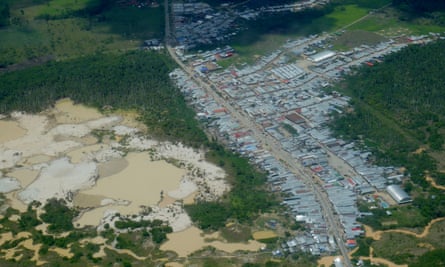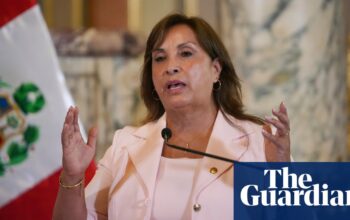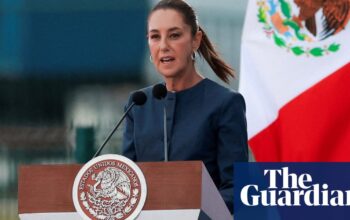According to a report, the United States has become a haven for illegal funds obtained by environmental offenders in the Amazon rainforest due to lack of transparency and inadequate monitoring.
According to the report, individuals involved in illegal logging and mining activities are investing large sums of money, ranging from millions to billions of dollars, into properties and assets in the United States. The report urges Congress and the White House to take action to tighten financial regulations and prevent these actions from further contributing to the destruction of the world’s largest rainforest.
Ian Gary, the executive director of the Financial Accountability and Corporate Transparency (Fact) Coalition, stated that their report aims to demonstrate that the United States is the most lenient country for concealing illicit funds. This is a significant issue that not only impacts national security, but also contributes to drug trafficking, corrupt practices, and environmental crimes.
In 2021, the US ranked first in the world financial secrecy index published by the Tax Justice Network due to issues with money laundering and loopholes in its financial transparency regulations.
The research conducted by Fact highlights the consequences of this issue on environmental offenses in the Amazon, a significant area with global implications for the climate. The document details six examples of connections between deforestation and American companies.
The state of Florida, with close ties to South America in terms of culture and language, has been identified as a significant location. The report highlights Goldex, previously one of Colombia’s top gold exporters, as an example. Goldex provided over 45 tonnes of gold, valued at $1.4 billion, to two US refineries, one of which was Republic Metals Corp (RMC) in Miami.
Subsequent investigations by Colombian prosecutors claimed that the gold was obtained through illegal mining and then funneled through shell corporations to facilitate money laundering for organized criminal organizations. As a result, the Colombian government imposed sanctions on the company and one of its suppliers was extradited to the United States to face accusations of drug trafficking and money laundering. Following a probe by the US attorney’s office, RMC consented to strengthening its internal policies on combating money laundering. This eventually led to Goldex filing for bankruptcy.
A highly profitable situation connecting Miami to countries in the Amazon region was the NTR Metals case, where the company admitted to not having a sufficient anti-money laundering system in place. This came to light after it was discovered that they had dealt with $3.6 billion (£3 billion) of illicit gold and counterfeit ingots from Peru.

The issue extended beyond Florida, affecting Maryland as well. According to reports, former president of Peru Alejandro Toledo purchased properties in an attempt to conceal and launder $1.2 million in bribes received from Odebrecht, a Brazilian construction company. These bribes were in exchange for a contract to construct the cross-Amazon interoceanic highway and other projects. Odebrecht has confessed to making the bribes and a court in the United States has ruled that the funds must be returned to Peru. Toledo maintains his innocence.
Different examples have connected a company in Nevada to the acquisition of unauthorized timber from the Loreto area in the Peruvian Amazon, and a business in Connecticut to the deforestation of indigenous land for a palm oil plantation.
Peruvian government regulators and watchdog groups have reported encountering difficulties in their efforts to investigate environmental crimes due to the involvement of US shell companies. According to Daniel Linares Ruesta, director of Peru’s financial intelligence unit, there have been instances where the source of illegal funds can be traced back to US companies.

The report highlights two main issues in the US system for governing financial transactions from foreign nations: lax regulations regarding identification, which permit the use of untraceable shell companies, and significant gaps in the anti-money laundering system, which allow real estate agents and refineries to accept payments without verifying and revealing the source of funds.
In the Amazon region, the Igarapé Institute predicted that environmental offenses generated profits of $110 billion to $281 billion per year. However, financial authorities in Latin America have not prioritized this issue. According to Insight Crime, there is evidence of a growing connection between environmental crime, drug trafficking, and money laundering in Brazil, Colombia, Peru, and Ecuador.
The report emphasizes the need for the US to assume greater responsibility as it is the main recipient of illicit funds, with the UK and its crown territories, such as the Cayman Islands, following closely behind.
Some of the suggestions include the US government making anti-money-laundering requirements for the real estate industry, aiding Amazon nations in enhancing financial regulation, and enacting the Corporate Transparency Act to create a registry of actual owners of all businesses. It also urges the US Congress to approve the Forest Act, which would classify illegal deforestation as a form of money laundering.
Gary expressed his optimism about the Biden administration acknowledging the danger of corruption. However, he emphasized that action is now necessary.
Gary stated that the United States must take action. He referenced our report, which highlights the significance of the US addressing its financial secrecy and working with law enforcement in the Amazon region to combat illegal financial transactions. The existence of financial secrecy in the US is a global issue.
Source: theguardian.com


